Related Research Articles

Eswatini, formally the Kingdom of Eswatini and also known by its former official name Swaziland and formerly the Kingdom of Swaziland, is a landlocked country in Southern Africa. It is bordered by Mozambique to its northeast and South Africa to its north, west, south, and southeast. At no more than 200 km (120 mi) north to south and 130 km (81 mi) east to west, Eswatini is one of the smallest countries in Africa; despite this, its climate and topography are diverse, ranging from a cool and mountainous highveld to a hot and dry lowveld.
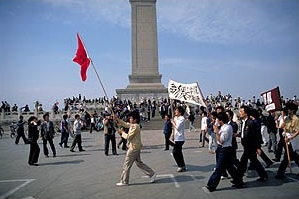
The Tiananmen Square protests, known in Chinese as the June Fourth Incident, were student-led demonstrations held in Tiananmen Square in Beijing, China, lasting from 15 April to 4 June 1989. After weeks of unsuccessful attempts between the demonstrators and the Chinese government to find a peaceful resolution, the Chinese government declared martial law on the night of 3 June and deployed troops to occupy the square in what is referred to as the Tiananmen Square massacre. The events are sometimes called the '89 Democracy Movement, the Tiananmen Square Incident, or the Tiananmen uprising.
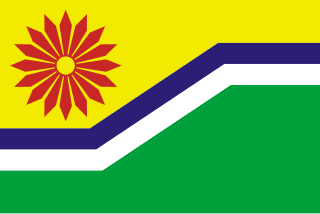
Mpumalanga is one of the nine provinces of South Africa. The name means "East", or literally "The Place Where the Sun Rises" in the Nguni languages. Mpumalanga lies in eastern South Africa, bordering Eswatini and Mozambique. It shares borders with the South African provinces of Limpopo to the north, Gauteng to the west, the Free State to the southwest, and KwaZulu-Natal to the south. The capital is Mbombela.
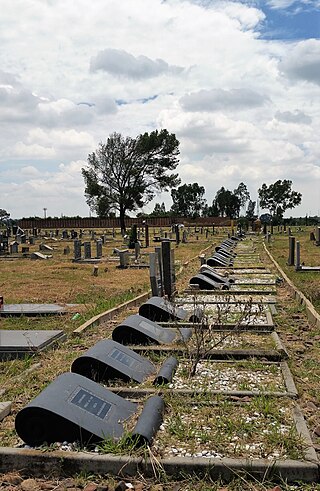
The Sharpeville massacre occurred on 21 March 1960, when police opened fire on a crowd of people who had assembled outside the police station in the township of Sharpeville in the then Transvaal Province of the then Union of South Africa to protest against the pass laws. A crowd of approximately 5,000 people gathered in Sharpeville that day in response to the call made by the Pan-Africanist Congress to leave their pass-books at home and to demand that the police arrest them for contravening the pass laws. The protestors were told that they would be addressed by a government official and they waited outside the police station as more police officers arrived, including senior members of the notorious Security Branch. At 1.30pm, without issuing a warning, the police fired 1,344 rounds into the crowd. For more than fifty years the number of people killed and injured has been based on the police record, which included 249 victims in total, including 29 children, with 69 people killed and 180 injured. More recent research has shown that at least 91 people were killed at Sharpeville and at least 238 people were wounded. Many people were shot in the back as they fled from the police.
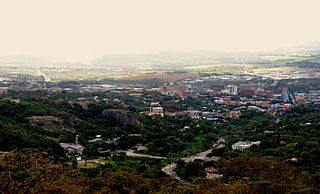
Mbombela, formerly Nelspruit, is a city in northeastern South Africa. It is the capital of the Mpumalanga province. Located on the Crocodile River, the city lies about 110 km (68 mi) by road west of the Mozambique border, 330 km (210 mi) east of Johannesburg and 82 km (51 mi) north of the Eswatini border. Mbombela was one of the host cities of the 2010 FIFA World Cup.

The Gwangju Uprising, known in Korean as May 18, was a series of student-led demonstrations that took place in Gwangju, South Korea, in May 1980, against the dictatorship of Chun Doo-hwan. The uprising was violently suppressed by the South Korean military with the approval and logistical support of the United States under the Carter administration, which feared the uprising might spread to other cities and tempt North Korea to interfere. The uprising is also known as the May 18 Gwangju Democratization Movement, the Gwangju Democratization Struggle, the May 18 Democratic Uprising or the Gwangju Uprising in South Korea.

The Orangeburg Massacre was a shooting of student protesters that took place on February 8, 1968, on the campus of South Carolina State College in Orangeburg, South Carolina, United States. Nine highway patrolmen and one city police officer opened fire on a crowd of African American students, killing three and injuring twenty-eight. The shootings were the culmination of a series of protests against racial segregation at a local bowling alley, marking the first instance of police killing student protestors at an American university.

Langa is a township in Cape Town, South Africa. Its name in Xhosa means "sun". The township was initially built in phases before being formally opened in 1927. It was developed as a result of South Africa's 1923 Urban Areas Act, which was designed to force Africans to move from their homes into segregated locations. Similar to Nyanga, Langa is one of the many areas in South Africa that were designated for Black Africans before the apartheid era. It is the oldest of such suburbs in Cape Town and was the location of much resistance to apartheid.

The protests of 1968 comprised a worldwide escalation of social conflicts, which were predominantly characterized by the rise of left-wing politics, anti-war sentiment, civil rights urgency, youth counterculture within the silent and baby boomer generations, and popular rebellions against military states and bureaucracies.

Alexander Sinton Secondary School, also known as Alexander Sinton High School, is an English-medium school in Athlone, a suburb of Cape Town, South Africa. The school is located in the Cape Flats, an area designated as non-white under the Group Areas Act during apartheid. The school was involved in the anti-apartheid student uprisings of the 1970s and 1980s. Staff and students at the school made headlines when they barricaded the police into their school in September 1985. The following month, three youths were killed near the school by police officers who opened fire on protesters in the Trojan Horse Incident. It was the first school to be visited by Nelson Mandela after his release from prison. As of 2014, the school has 1,100 pupils, half boys and half girls. The school employs 40 teachers and six non-teaching staff.

The Bisho massacre occurred on 7 September 1992 in Bisho, in the then nominally independent homeland of Ciskei which is now part of the Eastern Cape in South Africa. Twenty-eight African National Congress supporters and one soldier were shot dead by the Ciskei Defence Force during a protest march when they attempted to enter Bisho to demand the reincorporation of Ciskei into South Africa during the final years of apartheid.
Cleveland "Cleve" Sellers Jr. is an American educator and civil rights activist.
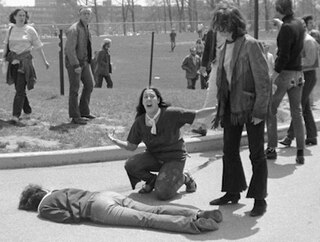
The Kent State shootings were the killing of four and wounding of nine unarmed college students by the Ohio National Guard on the Kent State University campus. The shootings took place on May 4, 1970, during a rally opposing the expanding involvement of the Vietnam War into Cambodia by United States military forces as well as protesting the National Guard presence on campus and the draft. Twenty-eight National Guard soldiers fired about 67 rounds over 13 seconds, killing four students and wounding nine others, one of whom suffered permanent paralysis. Students Allison Krause, 19, Jeffrey Miller, 20, and Sandra Scheuer, 20, died on the scene, while William Schroeder, 19, was pronounced dead at Robinson Memorial Hospital in nearby Ravenna shortly afterward.

Internal resistance to apartheid in South Africa originated from several independent sectors of South African society and took forms ranging from social movements and passive resistance to guerrilla warfare. Mass action against the ruling National Party (NP) government, coupled with South Africa's growing international isolation and economic sanctions, were instrumental in leading to negotiations to end apartheid, which began formally in 1990 and ended with South Africa's first multiracial elections under a universal franchise in 1994.

Kabokweni is a town in Ehlanzeni District Municipality in the Mpumalanga province of South Africa. Kabokweni was formally established in 1967 as the first residential township in the KaNgwane Bantustan. In 1968 the Bantu Affairs Department of the Apartheid state forcibly moved over 3000 people from the town of White River to Kabokweni. Today, it is a town of over 20 000 people.
Dr. Maitshwe Nchuape Aubrey Mokoape was a South African anti-apartheid activist and a leader of the Pan-Africanist Congress and Black Consciousness Movement. He was first arrested and detained at the age of 15. He studied and worked alongside political anti-apartheid activist Steve Biko. In post-apartheid South Africa, Mokoape became a physician.

The Sudanese revolution was a major shift of political power in Sudan that started with street protests throughout Sudan on 19 December 2018 and continued with sustained civil disobedience for about eight months, during which the 2019 Sudanese coup d'état deposed President Omar al-Bashir on 11 April after thirty years in power, 3 June Khartoum massacre took place under the leadership of the Transitional Military Council (TMC) that replaced al-Bashir, and in July and August 2019 the TMC and the Forces of Freedom and Change alliance (FFC) signed a Political Agreement and a Draft Constitutional Declaration legally defining a planned 39-month phase of transitional state institutions and procedures to return Sudan to a civilian democracy.
Prior to the civil rights movement in South Carolina, African Americans in the state had very few political rights. South Carolina briefly had a majority-black government during the Reconstruction era after the Civil War, but with the 1876 inauguration of Governor Wade Hampton III, a Democrat who supported the disenfranchisement of blacks, African Americans in South Carolina struggled to exercise their rights. Poll taxes, literacy tests, and intimidation kept African Americans from voting, and it was virtually impossible for someone to challenge the Democratic Party, which ran unopposed in most state elections for decades. By 1940, the voter registration provisions written into the 1895 constitution effectively limited African-American voters to 3,000—only 0.8 percent of those of voting age in the state.
References
- ↑ "An extra ordinary human disaster that lasted too long". ANC Today. Archived from the original on 14 March 2018.
- ↑ "TRC Final Report, Volume 3, Chapter 6, Subsection 67". SABC. Retrieved 6 January 2021.
- ↑ "Memorial lecture on the 26th Anniversary of the Lowveld Massacre". South African History Online. Retrieved 6 January 2021.
- ↑ "The lion of the lowveld". Learn and Teach Magazine. 22 October 2013.
- ↑ "Home is where the heart is". Sowetan. 21 February 2014.